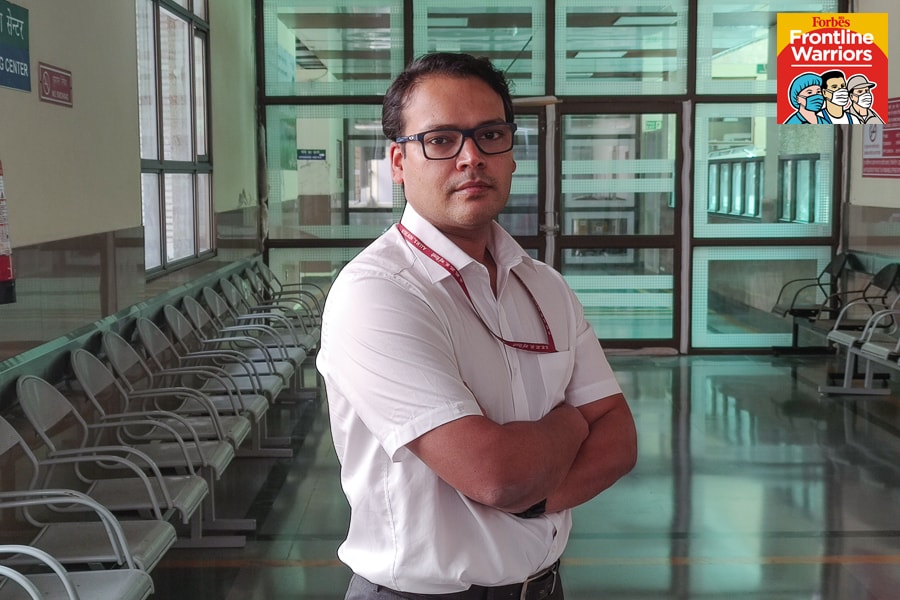'Always overworked and overwhelmed': A day in the life of a doctor
Dr Akhil Singh, like all doctors in India today, is putting his safety on the line to treat Covid-19 patients


 Dr Akhil Singh, Assistant Professor, Anaesthesiology, Pain Medicine and Critical Care, All India Institute of Medical Sciences, New Delhi, India
Dr Akhil Singh, Assistant Professor, Anaesthesiology, Pain Medicine and Critical Care, All India Institute of Medical Sciences, New Delhi, India
When Dr Akhil Kant Singh goes home every day after serving in the trauma centre at All India Institute of Medical Sciences, Delhi—which is now a dedicated centre for severely ill Covid-19 patients—he fears taking the virulent virus home with him. But, like all frontline workers fighting the pandemic in India right now, that’s the risk he has to take. For the patients, these doctors, nurses, and other hospital staff are their only hope for survival. “We’re always scared for our families, but the risk is part of the job," says Singh, a 38-year-old anaesthesiologist who lives with his wife and eight-year-old son.
The second wave of Covid-19 in India has turned into a humanitarian crisis, putting immense pressure on its health care infrastructure. Several hospitals across the country are stretched to capacities, while handling the surge in cases. India has about 12.5 lakh doctors for a population of 1.35 billion. As the daily number of infections hover between 3.5 lakh and 4 lakh, health care workers are having to treat Covid-19 patients with exceptionally limited resources.
“The nurses and resident doctors wear the PPE kits for close to 7 hours at a stretch. All the horror stories you hear in the news about not being able to perform bodily functions are all a common occurrence in any hospital today. But they never complain. Their contribution has been pivotal. No words can commend them enough for what they’re doing," says Singh.
The situation at AIIMS, like in several hospitals across the country, is distressing. “The number of patients coming in every day to get admitted far exceeds the available number of beds. The entire staff is always overworked and overwhelmed," says Singh, adding that because of the limitations, they have to choose the patients they can admit to the hospital.
The trauma centre at AIIMS earlier provided treatment to victims of road accidents, but since April it has been converted to a dedicated facility for severely ill Covid-19 patients. The centre has around 300 beds—of which 60 are ICU beds—and around 70 ventilators. “The centre is at capacity. Beds are always occupied. The patients affected by this second wave are sicker than before there are more complications this time. Covid ARDS [acute respiratory distress syndrome], sepsis, and renal failure are some of the issues we face with the sickest of patients," says Singh.
The trauma centre alone witnesses three to four deaths every day. “It becomes particularly hard to explain to the family and relatives that they can’t meet the patients, even for the ones with deteriorating health. Under normal circumstances, one attendant is allowed to visit the patients, but with Covid-19 being such an infectious disease, many families have had to say goodbye to the patients via video calls. Some families have a hard time accepting the fact, but we have no answers or solution for this. The human touch is always missed," says Singh.
He has been treating Covid-19 patients since the pandemic first started emerging in India. “There is always an uncertainty with this disease, especially with this wave now. The patients and families are concerned, and have more questions," says Singh, who is never off-duty. “I do leave the vicinity, but our work doesn’t end. My phone keeps ringing all night."
According to the World Health Organization, India now accounts for 1 in 3 Covid-19 cases being recorded globally, with mathematical models suggesting that we’re yet to witness the peak of the B.1.617 variant in India. Singh says that the vaccine is our best bet. “I’ve seen that the number of people who completed their vaccinations and then got affected is extremely low vaccines are turning out to be effective. I’d urge everyone to get vaccinated as soon as they can."
In the few months before the second wave rattled the country, people had started flouting Covid restrictions, which, Singh says, has led to where we are today. “We let out guards down too early, and now we’re seeing the consequences. These waves will keep happening if we do not take precautions. Even when the second wave subsides, we have to continue to maintain social distance and wear masks and have to follow all the precautions advised if we want to end this pandemic anytime soon," he says.
First Published: May 04, 2021, 13:45
Subscribe Now